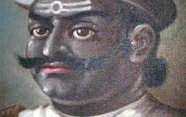I was born into a Newar family. So naturally I belong to certain caste or ethnicity. But all along my existence so far, my caste or ethnic identity has never come into conflict with my National identity. I have always been proud of calling myself a Nepali, and will remain so ever. And I have got the reward for my belief, and for being what I am.
When I say this, I am not at all undermining or ignoring the reality that disparity remains between castes , regions, families, genders and within the family. We need very well considered socio-economic welfare measures to address this problem.
How is Lakshman Tharu--a Young militant leader who has fire inside--who fought as a Maoist, but felt disillusioned with his leadership, but is still in the campaign for social and economic parity, of less importance for me at a time when he is undergoing treatment in the B and B Hospital here after he met with an accident in western Nepal about a week ago? The way some western funded, and perhaps 'western educated' ethnic leaders are campaigning, it looks like it is going to create a big social hiatus, caste vs caste, region vs region, men vs women, and what not? How on earth is it possible for a single ethnic group to have a province for them? Degeneration of Politics and politicians--and their hope that a society so divided will offer them political positions--is at the root of all this.
Malla K Sundar who has always failed to secure the support of the people in real politic does not blink his eyes when he claims in front of Maoist Chief Pushpa Kamal Dal , a Brahman by birth--that all the 1.23 million Newars across the country are for 'ethnic federalism' and therefore with you'? Malla's nearest ideological cousin Padma Ratna Tuladhar is a nice man to talk to. We often share jokes when we meet. He has always been raising slogan for his community's rights right from his Panchayat days. ( I did not have that courage to be part of the Panchayat system as we continued to crusade for restoration of multi-party parliamentary system). But when we contested the election for parliament in 2000 (2056 V S), he was far behind me. My nearest rival was Marichman Singh. Bharat Pradhan of the UML was in the third position, and Tuladhar was at the bottom going by the support extended by the people. Demographic composition of our constituency --in terms of caste ratio--was almost the same as it remains today.
Going by simple logic or arithmetic, three of us did not pursue caste based politics, but that should have gone to the advantage of Tuladhar and he should have won with handsome margin. Why did not it happen? Because people understood much better than most leaders that ethnic and caste based politics are used only by those who believe in the short term gain of themselves, and their families and community even if that means making compromises with the larger interest of the society and the nation. Politicians who do not believe in their political ideology tend to turn towards such short term approach.
Malla K Sundar who has always failed to secure the support of the people in real politic does not blink his eyes when he claims in front of Maoist Chief Pushpa Kamal Dal , a Brahman by birth--that all the 1.23 million Newars across the country are for 'ethnic federalism' and therefore with you'? Malla's nearest ideological cousin Padma Ratna Tuladhar is a nice man to talk to. We often share jokes when we meet. He has always been raising slogan for his community's rights right from his Panchayat days. ( I did not have that courage to be part of the Panchayat system as we continued to crusade for restoration of multi-party parliamentary system). But when we contested the election for parliament in 2000 (2056 V S), he was far behind me. My nearest rival was Marichman Singh. Bharat Pradhan of the UML was in the third position, and Tuladhar was at the bottom going by the support extended by the people. Demographic composition of our constituency --in terms of caste ratio--was almost the same as it remains today.
Going by simple logic or arithmetic, three of us did not pursue caste based politics, but that should have gone to the advantage of Tuladhar and he should have won with handsome margin. Why did not it happen? Because people understood much better than most leaders that ethnic and caste based politics are used only by those who believe in the short term gain of themselves, and their families and community even if that means making compromises with the larger interest of the society and the nation. Politicians who do not believe in their political ideology tend to turn towards such short term approach.
- TANAHU HYDROPOWER PROEJCT: A Significant Achievement
- Apr 15, 2024
- AMBASSADOR HANAN GODAR: Sharing Pain With A Nepali Family
- Mar 30, 2024
- VISIT OF KfW AND EIB TO NEPAL : Mission Matters
- Mar 25, 2024
- NEPAL BRITAIN SOCIETY: Pratima Pande's Leadership
- Mar 24, 2024
- NEPAL ARMY DAY: Time To Recall Glory
- Mar 15, 2024
















